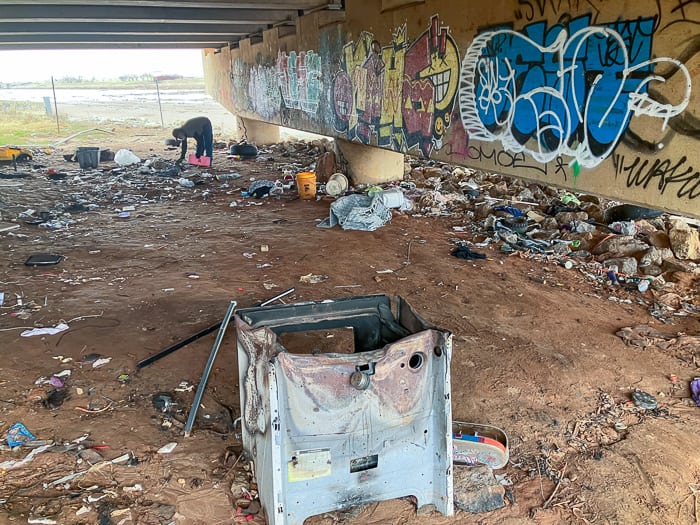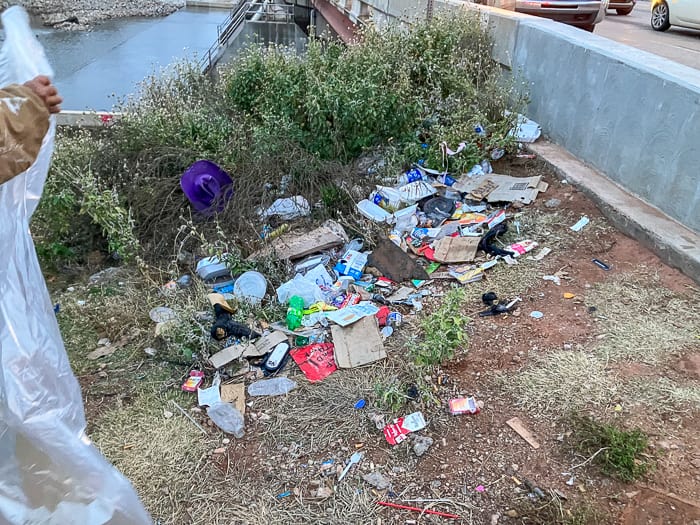OKLAHOMA CITY — Oklahoma City’s Key to Home Partnership – a citywide coordinated effort of city services, non-profit outreach groups, and private organizations working in tandem to house people quickly and directly from living on the street – has reported some clear successes following an operational restructuring in recent months.
Launched in the spring of 2023, the Key to Home Partnership was organized with the intent of finding new, faster avenues for housing and assisting Oklahoma City residents experiencing homelessness, in particular those living in street encampments throughout the city.
Through this joint effort – including more than 40 individual agencies, both public and private – and on the heels of a concerted refocusing of duties and operations, Key to Home was able to house more than two dozen people living in street encampments in December.
“These people are extremely vulnerable,” says Key to Home communications manager Jamie Caves. “That’s part of the reason for this encampment re-housing initiative, and why we’re going directly to them, removing barriers and reducing the timeline to get them into housing faster.”
Encampment re-housing initiative
“Encampment re-housing” is the process of getting someone into housing directly from the streets instead of first helping them into a temporary shelter where they can access housing assistance services.
It was this approach that member groups of the Key to Home Partnership used in December to successfully house 31 people previously living in encampments at SW 15th and Portland Ave., I-40 and MLK Blvd., and I-44 and Penn.
Though it’s not a new concept, encampment re-housing is normally much more difficult than in-shelter assistance, due primarily to the usual costs and lengthy timelines required to secure the housing units needed, barriers that can be greatly reduced through the inclusion of the partnership’s private funding.

“Due to the private funding, we’re able to hold units,” Caves explained. “Before, one of the barriers was that you would find someone and talk to them about housing, but by the time you get them approved, then you have to go find the housing, which also takes months. And oftentimes we lose contact with that person during this time, because it’s just such a long process.”
The ability to utilize funds and resources from the Key to Home Partnership’s private members has changed that.
“The private dollars allow us to pay holding fees, so we can go ahead and rent those apartments,” said Caves. “So when we’re getting ready to go to a camp where we know there’s about ten people, then we can work to secure and hold ten apartment units so that we have them ready, and we’re able to move people in within about a three to six-week time period.”
Restructuring
The partnership’s ability to secure and hold needed housing units more easily than in the past is also due in part to the newly re-focused responsibilities of member organizations redefined in Key to Home’s recent restructuring.
“A really important piece of the structural change is kind of piecing that out and making the flow of the system work better,” said Caves. “One of the pieces of that is having City Rescue Mission as the provider that’s taking care of landlord engagement. They go out and create relationships with apartment complexes and discuss where our program is and the benefits of renting to our clients, and they secure the units that we need.”
The decision to task some of the partnership’s member groups with dedicated duties and responsibilities is the result of nearly a year’s worth of considering and refining the approaches taken and the efficiency of housing strategies used.
“It was very intentional,” she said. “There’s been a lot of work to identify what gaps there were, and lots of meetings with leadership and stakeholders about what gaps we have, and what do we want our system to look like and flow better.”
Lofty goals
These evolving approaches are all in pursuit of the lofty goals laid out by Key to Home organizers upon the partnership’s creation last year.
The Key to Home action plan lists four specific goals for the first two years:
- Create a new governance system.
- Address homelessness differently by improving infrastructure and capacity.
- Achieve a 25% reduction in Youth Homelessness by re-housing or diverting 100 youth by 2025.
- Achieve a 75% reduction in chronic Unsheltered Homelessness by re-housing 500 people experiencing unsheltered homelessness by 2025.
Closing camps
Now that the new strategies are producing positive results and quick housing, leaders are hoping to ramp up their efforts and top last month’s successes as the new year gets underway, even as they expect to continue studying and fine-tuning their tactics.
“This month, we’re looking to close three camps,” Caves said, referring to the practice of “closing” and “decommissioning” homeless encampments after successfully housing residents, a process intended to clean and beautify the areas, but also to prevent further camping at the site.

Caves makes it clear, however, that the goal of the Key to Home Partnership – and of each of its member groups and organizers – is not to prevent street camping, but to eventually remove the need for camping altogether through outreach and a greater, easier availability of services.
“The intention is not to arrest. Ever,” she said. “The intention is to help people and to give them the support that they need.”
To learn more about Oklahoma City’s Key to Home Partnership, including a list of member groups, homeless outreach resources, and donation and volunteer opportunities, visit okc.gov/government/key-to-home.
Brett Fieldcamp has been covering arts, entertainment, news, housing, and culture in Oklahoma for nearly 15 years, writing for several local and state publications. He’s also a musician and songwriter and holds a certification as Specialist of Spirits from The Society of Wine Educators.











